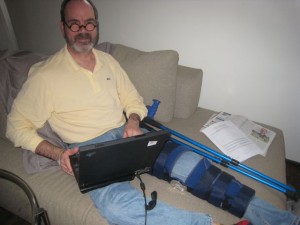Placebo, Nocebo — Worried Sick.

It was the gluten.
A few months ago, I was experiencing some intestinal problems. (I’ll spare you the details). Suellen suggested that I cut back on my gluten consumption. I did and my symptoms abated.
Was it gluten? Or was it nocebo?
As I study up on happiness, I frequently run across the placebo effect. The idea is simple: if you expect a treatment to make you feel better, … well, then you’ll feel better, even if the treatment is useless. It’s the power of positive thinking.
What about the opposite? Can you think yourself into a bad mood? Well, … duh … of course you can. Our thinking affects our mood (and vice versa). But can negative thinking affect our health? Even if we don’t know we’re thinking negatively?
Welcome to nocebo. Nocebo (Latin for I will harm) is essentially the opposite of placebo (Latin for I will please). In both cases, the effects are real. Things actually do change in your body. But the treatment doesn’t cause the changes. The mind does.
The nocebo effect often pops up during pharmaceutical testing. Researchers randomly assign people to experimental and control groups. The experimental group receives the treatment. The control group receives an inert treatment, often described as sugar pills.
In the best tests — the double blind – neither the subjects nor the researchers know which person is in which group. All the procedures – except the actual treatment — are exactly the same.
The researchers read the same warnings to both groups. Typically these include warnings about side effects. In many such studies, some of the people in the control group experience the side effects they were warned about. Their minds create the nocebo effect.
The nocebo effect can disrupt important pharmaceutical studies. But it doesn’t stop there. As pointed out in several articles, (here, here, and here) we can literally worry ourselves sick. People living near wind farms may report various forms of sickness and insomnia. Mobile phone users may report headaches (and fear much worse). People near wi-fi signals may report “…headaches, nausea, exhaustion, tingling, trouble concentrating, and gastrointestinal distress, among other symptoms.”
When researchers closely study these phenomena, however, they find no link between the supposed cause and the effect. The mind is filling the gap and causing the effect. As various researchers have found, all it takes is a little gossip or a few media reports.
Can we suppress the nocebo effect by not warning people of the dangers of various modern technologies? That would certainly raise ethical questions. It may also have practical limits. We normally assume that the placebo and nocebo effects occur because we don’t know certain things. We don’t know that we’re getting an inert treatment and, therefore, our symptoms either get better (placebo) or worse (nocebo) based on our expectations. Our minds are deceiving us.
But one study found that even when people knew they were getting an inert treatment, they still got better. Titled “Placebos Without Deception”, the study told people with irritable bowel syndrome (IBS) that they would receive “placebo pills made of an inert substance, like sugar pills, that have been shown in clinical studies to produce significant improvement in IBS symptoms through mind-body self-healing processes”. The result: symptoms improved. The placebo worked, even without the benefit of deception. If placebos work without deception, might nocebos work the same way?
So, did gluten cause my intestinal distress? Hard to say. I’ve heard so much about gluten intolerance lately, that I may just have thought myself into intestinal problems. It may well be time to heed the BBC’s advice: “Beware the scaremongers. Like a witch doctor’s spell, their words might be spreading modern plagues.”
Brian Williams and Core Priorities

Values clarification.
In their book Decisive, Chip and Dan Heath write about the need to honor our core priorities when making decisions. They write that “An agonizing decision … is often a sign of a conflict among ‘core priorities’ … [T]hese are priorities that transcend the week or the quarter … [including] long-term goals and aspirations.”
To illustrate their point, the Heath brothers tell the story of Interplast*, the non-profit organization that recruits volunteer surgeons to repair cleft lips throughout the world. Interplast had some ”thorny issues” that caused contentious arguments and internal turmoil.
One seemingly minor issue was whether surgeons could take their families with them as they traveled to remote locations. The argument in favor: The surgeons were volunteering their time and vacations. It seems only fair to allow them to take their families. The argument against: The families distract the surgeon from their work and make it more difficult to train local doctors.
The argument was intense and divisive. Finally, one board member said to another, “You know, the difference between you and me is you believe the customer is the volunteer surgeon and I believe the customer is the patient.”
That simple statement led Interplast to re-examine and clarify its core priorities. Ultimately, Interplast’s executives resolved that the patient is indeed the center of their universe. Once that was clarified, the decision was no longer agonizing – surgeons should not take their families along.
I thought of Interplast as I read the coverage of Brian Williams’ situation at NBC. In much the same way as Interplast, NBC had to clarify its core priorities. The basic question is whom does NBC serve? Is it more loyal to Brian Williams or to its viewing audience?
In normal times, NBC doesn’t have to answer this question. It can support and promote its anchor while also serving its audience. In a crisis, however, NBC is forced to choose. It’s the moment of truth. Does the company support the man in whom it has invested so much? Or does it protect its credibility with the audience?
Ultimately, NBC sought to protect its credibility. I was struck by what Lester Holt said on his first evening on the air: “Now if I may on a personal note say it is an enormously difficult story to report. Brian is a member of our family, but so are you, our viewers and we will work every night to be worthy of your trust.”
Holt’s statement suggests to me that NBC’s core priority is credibility with the audience. I certainly respect that. It also struck me as being very similar to the question Interplast asked itself.
Clarifying your core priorities is never a simple task. Indeed, it may take a crisis to force the issue. But once you complete the task, everything else is simpler. As my father used to say: Decisions are easy when values are clear.
Here are links to two articles from the New York Times that report on how NBC executives reached their decisions regarding Brian Williams. (Click here and here)
*Interplast has been renamed ReSurge International. Its website is here.
Seldom Right. Never In Doubt.

I’m never wrong. About anything.
Since I began teaching critical thinking four years ago, I’ve bought a lot of books on the subject. The other day, I wondered how many of those books I’ve actually read.
So, I made two piles on the floor. In one pile, I stacked all the books that I have read (some more than once). In the other pile, I stacked the books that I haven’t read.
Guess what? The unread stack is about twice as high as the other stack. In other words, I’ve read about a third of the books I’ve acquired on critical thinking and have yet to read about two-thirds.
What can I conclude from this? My first thought: I need to take a vacation and do a lot of reading. My second thought: Maybe I shouldn’t mention this to the Dean.
I also wondered, how much do I not know? Do I really know only a third of what there is to know about the topic? Maybe I know more since there’s bound to be some repetition in the books. Or maybe I know less since my modest collection may not cover the entire topic. Hmmm…
The point is that I’m thinking about what I don’t know rather than what I do know. That instills in me a certain amount of doubt. When I make assertions about critical thinking, I add cautionary words like perhaps or maybe or the evidence suggests. I leave myself room to change my position as new knowledge emerges (or as I acquire knowledge that’s new to me).
I suspect that the world might be better off if we all spent more time thinking about what we don’t know. And it’s not just me. The Dunning-Kruger effect states essentially the same thing.
David Dunning and Justin Kruger, both at Cornell, study cognitive biases. In their studies, they documented a bias that we now call illusory superiority. Simply put, we overestimate our own abilities and skills compared to others. More specifically, the less we know about a given topic, the more likely we are to overestimate our abilities. In other words, the less we know, the more confident we are in our opinions. As David Dunning succinctly puts it, “…incompetent people do not recognize—scratch that, cannot recognize—just how incompetent they are.”
The opposite seems to be true as well. Highly competent people tend to underestimate their competence relative to others. The thinking goes like this: If it’s easy for me, it must be easy for others as well. I’m not so special.
I’ve found that I can use the Dunning-Kruger effect as a rough-and-ready test of credibility. If a source provides a small amount of information with a high degree of confidence, then their credibility declines in my estimation. On the other hand, if the source provides a lot of information with some degree of doubt, then their credibility rises. It’s the difference between recognizing a wise person and a fool.
Perhaps we can use the same concept to greater effect in our teaching. When we learn about a topic, we implicitly learn about what we don’t know. Maybe we should make it more explicit. Maybe we should count the books we’ve read and the books we haven’t read to make it very clear just how much we don’t know. If we were less certain of our opinions, we would be more open to other people and intriguing new ideas. That can’t be a bad thing.
Have We Got It All Backwards?

Don’t shoot!
The concept of cause-and-effect is very slippery. We think that A causes B only to find that C really causes both A and B. Or, perhaps it’s really B that causes A. More subtly, A might influence B which turns right around and influences A.
Lately, I’ve been thinking that we’ve been looking at a lot of things from the wrong end of the telescope. Some examples:
Our brain creates us – what creates our personality and the essence of who we are? Why our brains, of course. My brain is the cause; my personality is the effect. Further, the brain is what it is; there’s not much we can do about it. Well…not so fast. Maybe we got it backwards. It turns out that the brain is plastic; we can change it through our habits, actions, and thoughts. In many ways, we create our brains rather than the other way round. Norman Doidge is a leading writer on brain plasticity. You can find his books here and here.
Mutate first; adapt later – our general model of evolution suggests that random mutations happen in our DNA. Mutations that provide a competitive edge are then preserved and passed on. Mutations that aren’t so helpful just fade away. But, according to a recent article in New Scientist, we may have it backwards. Again, plasticity is a key concept. “A growing number of biologists think … plasticity may also play a key role in evolution. Instead of mutating first and adapting later, they argue, animals often adapt first and mutate later.”
I am the master of my fate – I used to believe that I was in control. Now I realize that my System 1 often makes decisions without any input from “me”. Indeed, I don’t even know the decisions are being made. But it’s not just my “primitive brain” that molds my behavior. It’s also how fast my heart beats and how healthy my vagus nerve is. But it’s not even just my body that steers me. It’s also the microbes in my gut. When the microbes team up, they can make me do bizarre things – like eating chocolate. They may even contribute to schizophrenia.
OCD starts with thoughts – we’ve always assumed that irrational thoughts create obsessive compulsive disorder. Irrational thoughts begin in the brain and radiate outward to produce irrational behavior. But, as Clare Gillan points out, we may have it backwards. When she induced new habits in volunteers, she found that people with OCD change their beliefs to explain the new habit. In other words, behavior is the cause and belief is the effect.
The gardener manages the garden – Suellen loves to garden and will spend hours at hard labor under a hot sun. When I see how hard she works, I wonder if she’s managing the flowers or if they’re managing her. It’s not a new thought. The Botany of Desire makes the same point.
What else have we gotten backwards? It’s hard to know. But, as the Heath brothers point out in Decisive, if you believe A causes B, you owe it to yourself to consider the opposite.
Good Decisions, Bad Outcomes

Bad Decision or Bad Outcome?
The New England Patriots won the Super Bowl because their opponents, the Seattle Seahawks, made a bad decision. That’s what millions of sports fans in the United States believe this week.
But was it a bad decision or merely a bad outcome? We often evaluate whether a decision was good or bad based on the result. But Ronald Howard, the father of decision analysis, says that you need to separate the two. You can only judge whether a decision was good or bad by studying how the decision was made.
Howard writes that the outcome has nothing to do with the quality of the decision process. A good decision can yield a good result or a bad result. Similarly, a bad decision can generate a good or bad outcome. Don’t assume that the decision causes the result. It’s not so simple. Something entirely random or unforeseen can turn a good decision into a bad result or vice versa.
But, as my boss used to say, we only care about results. So why bother to study the decision process? We should study only what counts – the result of the process, not the process itself.
Well, … not so fast. Let’s say we make a decision based entirely on emotion and gut feel. Let’s also assume that things turn out just great. Did we make a good decision? Maybe. Or maybe we just got lucky.
During the penny stock market boom in Denver, I decided to invest $500 in a wildcat oil company whose stock was selling for ten cents a share. In two weeks, the stock tripled to 31 cents per share. I had turned my $500 stake into $1,500. I was a genius! (There’s a touch of confirmation bias here).
What’s wrong with this story? I assumed that I had made a good decision because I got a good outcome. I must be smart. But, really, I was just lucky. And you probably know the rest of the story. Assuming that I was a smart stock picker, I re-invested the $1,500 and – over the next six months – lost it all.
Today, when I evaluate stocks with the aim of buying something, I repeat a little mantra: “I am not a genius. I am not a genius.” It creates a much better decision process.
I was lucky and got a good outcome from a bad decision process. The Seattle Seahawks, on the other hand, got the opposite. From what I’ve read, they had a good process and made a good decision. They got a horrendous result. Even though their fans will vilify the Seahawks’ coaches, I wouldn’t change their decision process.
And that’s the point here. If you want good decisions, study the decision process and ignore the outcome. You’ll get better processes and better decisions. In the long run, that will tilt the odds in your favor. Chance favors the thoughtful decision maker.
What makes for a good decision process? I’ll write more about that in the coming weeks. In the meantime, you might like two video clips from Roch Pararye, a professor at the University of Pennsylvania, who explains why we separate decision processes from decision results. (Click here and here).